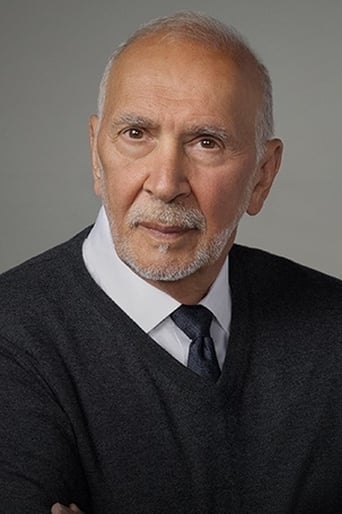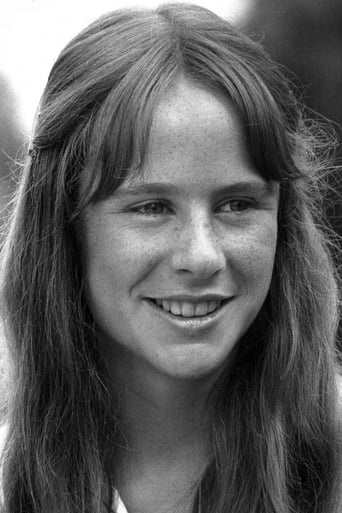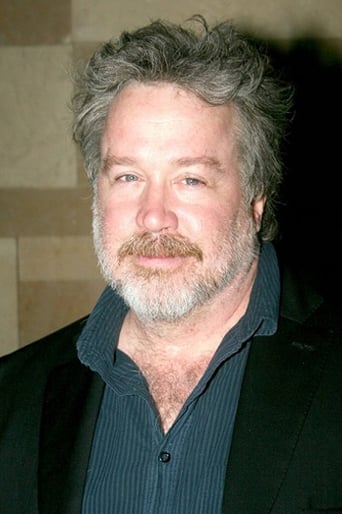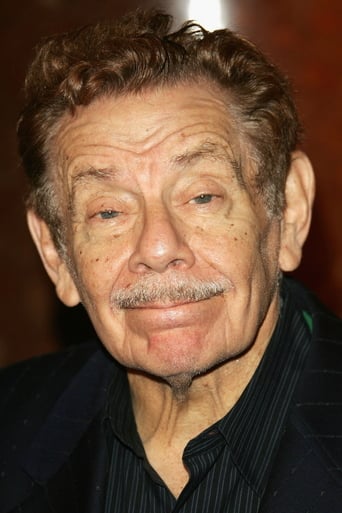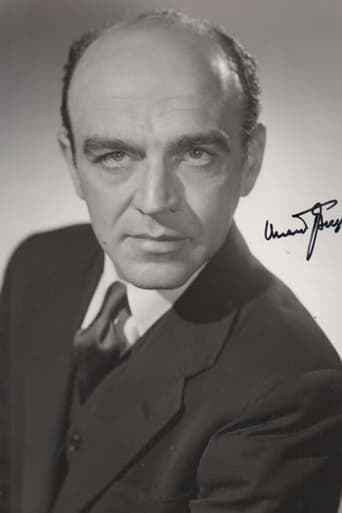AnhartLinkin
This story has more twists and turns than a second-rate soap opera.
Jenna Walter
The film may be flawed, but its message is not.
Anoushka Slater
While it doesn't offer any answers, it both thrills and makes you think.
Maleeha Vincent
It's funny, it's tense, it features two great performances from two actors and the director expertly creates a web of odd tension where you actually don't know what is happening for the majority of the run time.
atlasmb
Released in 1980, "Those Lips, Those Eyes" is a film I missed seeing at the time. In fact, I don't even remember it being in theaters, despite the fact that I went to many films around that time and I thought I had seen all of Glynnis O'Connor's films of that era. Either it was not promoted well or I gleaned from reviews that it was a real dud.Having recently watched it, however, I find it is not without its charms. Written by David Shaber--who also wrote the screenplay for "The Warriors"--the film is a coming of age story about a young man who is studying pre-med in Ohio when he is exposed to the world of live theater.Artie Shoemaker (Tom Hulce) knows nothing of the theater world when he takes a summer job handling props and scenery for a regional outdoor theater. As many who are exposed to the peculiar charms of the stage, Artie is enchanted. The male lead of the summer season is Harry Crystal--played by stage star Frank Langella. Harry seems like a guy who has it all together and is on top of the world. But Artie has much to learn.During the summer, Artie learns about the magic, the dreams, the drama, and the heartbreak that accompany life onstage and backstage. He falls for a dancer, Ramona (Glynnis O'Connor), who personifies the illusions of love and the theater. He decides to drop our of school and become a playwright.The film was shot at a Cleveland Heights outdoor theater venue and it feels genuine to the theater experience. The actors perform well, even if their parts are not too demanding. Four years after this film, Tom Hulce--also a stage star--will play the lead role in the amazing film "Amadeus". This film's greatest allure for me is the roster of notable actors. Hulce, O'Connor and Langella did not appear in relatively many films between them, given the visibility of their careers around the time of this film.
SHAWFAN
And what is its genre? The backstage expose story; what theatrical life is really like behind those Broadway (and other) curtains. It certainly has a lot of competition: Singin' in the Rain both I and II (1929 and 1952), 42nd Street, Golddiggers of (You name the year.); Dames of 1934; Noises Off (1992) from the farcical side and A Star is Born I and II from the 1930s and the 1950s from the tragical side: not to mention Summer Stock of 1950: the list keeps rollin' along. So what makes this movie so special? And why are there so few comments about this stunningly great movie? Have so few people actually seen it? How amazing to see a younger Frank Langella pre-Dracula and pre-Frost-Nixon by 30 years! How amazing to see the fresh and talented Tom Hulce so pre-Amadeus! And yet another superb Stiller! What a wonderful line-up of talented people at their very best from so long ago! And such a script! Who was this David Shaber? So full of realistic disillusion and pathos compared to the usual sentimentality and feel-good comedy! As especially exemplified by the Star-Is-Born-like episode where the heroine achieves Broadway while the Langella character has to content himself with still another provincial tour.Langella's subsequent hysterical and sadistic blowup against the star-struck Latin teacher and his granddaughter in which he vents his fury and frustration is just one of many fantastic and psychologically real moments in the film. (The Latin teacher and his love affair with backstage life certainly echo Marlene Dietrich and her seduced professor in The Blue Angel of 1929.) Another in the series of mercenary and cold-hearted agents like the late Kevin McCarthy who was preceded by Burt Lancaster in The Sweet Smell of Success (1957) and succeeded by Alan Alda in Clubland (2001) in movie history. The sexual liberation of the Hulce character recalls similar incidents in O'Neill's great comedy Ah, Wilderness.And what a tribute to the vanished operettas of long ago: The Red Mill of Victor Herbert; Rose Marie and The Vagabond King of Rudolf Friml; The Desert Song of Sigmund Romberg etc. What satirical insertions of bits from the great plays like Romeo and Juliet. Tributes to the theater itself as expostulated by the star Langella. The richness and depth of this movie are simply endless. And to be saddled by such a title! Who could have an inkling of what this great movie is about from such a ridiculous and unsuggestive title? But on the other hand, what title could one have applied to such a magnificent drama which might have lived up to its stirring, emotional content?PS: I just saw (2009) Frank Langella in his latest acting spectacular: as Richard Nixon in Frost-Nixon. How this great actor after 30 years simply goes from triumph to triumph!
Robert J. Maxwell
Tom Hulce is Artie Shoemaker, a college student who is taking all pre-med courses, less out of interest than because of his father, a hard-working junk man. This is one of those families in which the fetus is not considered viable until it graduates from medical school. Lamentably, Hulce's heart is with the theater. A touring company is in the small town over the summer of 1951 to present operettas and Hulce, who would like some day to perhaps be a playwright, is hired to buggy lug properties around and generally assist in the stagecraft.Over the course of the summer, Hulce comes to know the actors and crew rather well. The leading man, Frank Langella, becomes a kind of brusque but perceptive mentor, showing him the ropes. He also gets to know one of the petite rats who dance behind the singers, Glynnis O'Connor. There are other assorted presences, chief among them George Moforgen as the obnoxious, insulting director.Hulce quits his tough courses and develops plans to move to New York and write for the stage. This perturbs Tom Hulce's father, Ben Stiller, no end. Hulce explains to his Dad that he may wind up winning awards. "You know what?", Stiller exclaims, "I hope you do. I hope you win a Nobel Prize because, believe me, if you quit college you're gonna need it." That's common sense talking for you.On the other side of the ledger, Hulce falls for the lovely Glynnis O'Connor who looks like the kind of high-school classmate that every boy dreams about -- before he goes to sleep. He winds up spending a night with her too. And at HER invitation. "C'mon, let's make a memory," she says, turning off the lights and slipping out of her hampering garments. She's a pretty toothsome morsel in the nude. Hulce gawks in rapturously. "You just do what I do," she murmurs. Well, I'm glad there was this gratuitous nudity -- all nudity in scenes like this being gratuitous. But I must say, this is 1951? And SHE is seducing HIM? That's not how I visualize 1951.Anyway, so that's the central conflict in the plot. Will the adolescent Tom Hulce, in the Mathew Broderick part, continue his education and become the fantastically wealthy and universally respected doctor his father wants him to be? Or will he "follow his bliss", as Joseph Campbell would have advised, and go on to be a gargantuan failure on Broadway. OY. Vot a Jewish story DIS is! Didn't Al Jolson suffer a similar conundrum in "The Jazz Singer"? Well, "all that glitters is not gold," as Cecil's "Textbook of Medicine" says. Langella's leading man is dying to get back to New York and leave the sticks and their damned cicadas far behind, but his agent, Kevin McCarthy, is neglectful and keeps putting him into touring companies for now and for the foreseeable future as long as such parts exist. And the luscious Glynnis O'Connor has the same longings, but in her case, after an hour or two spent with the smitten McCarthy, she finds herself with a part in a Cole Porter musical on Broadway. Also, she's married, which perhaps explains her casual carnality.The ending is bitter and sweet at the same time. Hulce is disillusioned but grown up. He decides to return to pre-med and drop his grandiose theatrical plans. He doesn't quite make it into medical school but becomes an orthodontist instead. "He's the best dentist in Tecumsah County, maybe the whole STATE!", boasts Ben Stiller. I made that last part up, although it might have happened.
stuhh2001
It's understandable that one reviewer called the show scenes in the movie,"musicals", and Hollywood did make screen musicals of them. But they are excerpts from the genre of operetta. This was a pre 1940 style of "light comic" music drama, originating in Europe, at the turn of the century. Among the leading composers were Franz Lehar, and Victor Herbert. The cast had to have operatic voices, and sing, not talk the song a la Rex Harrison in "My Fair Lady". Of course in direct rebutal, to what I just said, Frank Langella, a non singing actor, sings "Someday", in a sotto voce (soft) style a la Perry Como. If someone says, "Summerstock, and operetta", and you go, "Huh?", this is not the movie for you, which is why about seven people saw it. This was summer live musical theatre, where youngsters with stars in their eyes, and pros who were never superstars, performed operetta classics in local theatres all over the country, like "The Merry Widow", "Rose Marie", and "The Desert Song". The plots are corny and ludicrous....but the songs...."Someday", "One Alone", "One Kiss", make me cry, because I remember how long ago it was when I first heard them and their beauty captures me more and more. Frank Langella is wonderful, as the romantic male lead in all the shows, who you know is not going to make it to stardom. Glynnis O'Connor, as the ingenue who breaks Tom Hulce's heart is impressive, and to show what an unstable field showbiz is, imdb has no credits for her from 98 to 02. I think Tom Hulce is a highly underrated actor. There's something so endearing about him, but the great roles don't seem to be offered to him today. I own this film and I've watched it over and over. As the pros say, "highly recommended".


